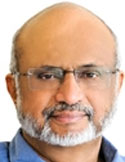
By M.D. Nalapat
10 September, 2016
No income-tax officer seems at all curious as to how those loyal to Pakistan and who are resident in Kashmir maintain such opulent lifestyles.
Recently, CNN aired visuals by Clarissa Ward, a correspondent who claimed to be reporting from “Free Syria”, i.e. that part of the country that had been prised loose from Bashar Assad. While she had to wear a black abaya while in “freedom”, in Assad’s “unfree” Syria, Ward would have been unmolested even in denims or short skirt, presumably dresses that are more familiar to her than the dress she was in while interviewing “freedom loving” fighters.
Such hypocrisy is equally commonplace among Ward-style foreign correspondents in Kashmir, who ignore the reality of the “Azadi” being sought by a violent minority of the people of Jammu & Kashmir being a licence to enforce Taliban-style laws on the population, including stoning to death and chopping off hands. CNN (or the Washington Post, for that matter) has been consistent from the 1990s in backing the Wahhabis in Kashmir, as they were in the case of Libya, when the likes of Arwa Damon and Hala Gorani traipsed around the country in support of the war unleashed in 2011 by Hillary Clinton and other western leaders.
In our pell-mell rush to follow US fashions, most of the media in India has continued the error made by Atal Behari Vajpayee during 1998-2004, that of confusing “Wahhabiat” with Kashmiriyat. What organisations such as the Hurriyat seek to achieve in Kashmir is the total replacement of the gentle, Sufi ethos of the state with the harshness of Wahhabism, something which ought to have been clear from at least the 1990s, but which is apparently yet to be understood even by several policymakers.
Appeasing the backers of Wahhabiat damages the chances of Kashmiriyat making a comeback in the Valley, and hence it is not surprising that every gesture of “reconciliation” (i.e. surrender to the Wahhabis) has been followed by a further descent into chaos. This columnist had from the start warned that the “healing touch” touted by the PDP-BJP alliance should bypass the Wahhabis entirely and concentrate on those in Kashmir who still believe in the moderate ethos of that state. Instead, as has been taking place in the state since 1975, it was the Wahhabis who were coddled by Chief Minister Mufti Mohammad Sayeed, and which made the present situation in Kashmir inevitable.
According to individuals who are current with the facts, an unambiguous signal was sent from within the state government to the Pakistan lobby that the police would largely look the other way should there be protests. This perception of police inaction was the spark which led to the present flame-up, not the killing of a youthful terrorist, although here as well, the UPA policy of refusing to return the remains ought to have been followed. Those who advised the NDA otherwise need to lose their jobs.
Thus far, it does not appear that a single individual from those who have motivated and fuelled so many unwary youths in Kashmir into forfeiting their futures has been held to account. And this in a country where the colonial system of governance ensures that citizens get jailed first while the police question him later, presuming they ever do, that is. In a country where a policy of zero tolerance for black money has been initiated by the Prime Minister, no income-tax officer seems at all curious as to how those loyal to Pakistan and who are resident in Kashmir maintain such opulent lifestyles.
What Hurriyat seeks to achieve in Kashmir is the total replacement of the gentle, Sufi ethos of the state with the harshness of Wahhabism.
After an initial Wahhabi-appeasing stance, Chief Minister Mehbooba Mufti appears to be sensing the error in pursuing a soft approach towards those who ultra-hard working for a Wahhabi future for Kashmir. In Delhi, Lutyens Zone policymakers have for long outsourced their thinking to US-based think-tanks, almost all of whom adopt a Wahhabi-friendly tilt in their recommendations. While the US is indeed important in the external security of India, to listen to advice from Washington on matters relating to internal security would lead to a splintering of India. Any country that has followed the US administration’s prescriptions in such matters has spiralled into hell till reversing course, Egypt being a recent example.
Even after having the door slammed in their faces, it is inexplicable why leaders of so many political parties seek to pamper with public funds the self-declared agents of GHQ Rawalpindi in the Kashmir valley. Taxpayers need to file a petition in court demanding that those policymakers who spend hundreds of crores of rupees of taxpayer money in providing facilities to wannabe Pakistani citizens in Kashmir should be made to repay the cost of such generosity out of their own wealth and income. When members of the Hurriyat are treated at airports and elsewhere with the deference and the protocol shown to Union ministers, it is no surprise that they have contempt for the Indian state.
The best course would be to give them a ticket to Pakistan, tearing up their Indian passports at the point of departure. However, before that, it ought to be a criminal misuse of state funds to spend any public money on their upkeep, travel, security or other needs. Vajpayee was correct that Kashmiriyat needs to be encouraged. He was wrong in assuming that pandering to Wahhabiat would assist the return of Kashmiriyat to the Valley. Only those who accept the need for “Ekta” should be shown any “Mamata”.
Source: sundayguardianlive.com/opinion/6400-don-t-confuse-wahhabiat-kashmiriyat




 Moderate Islamist here
Moderate Islamist here


0 comments:
Post a Comment